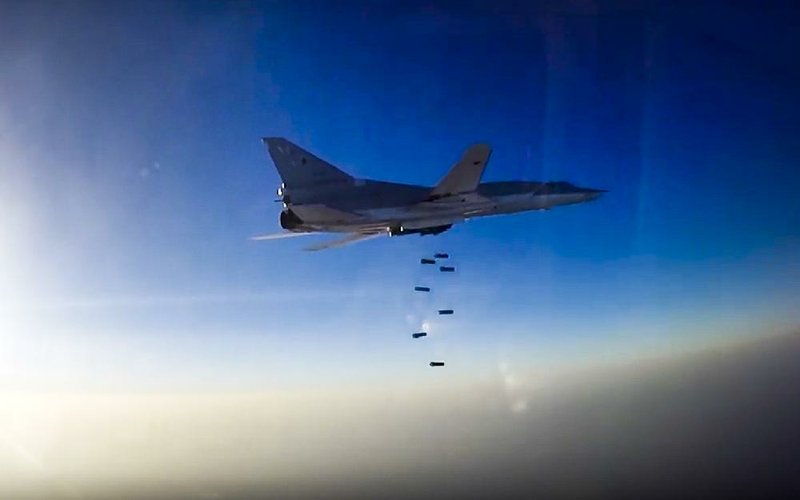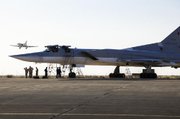MOSCOW -- Russian warplanes took off Tuesday from a base in Iran to target Islamic State fighters and other militants in Syria, Russia's Defense Ministry said, widening Moscow's bombing campaign in Syria in a major development in the country's civil war.
RELATED ARTICLE
http://www.arkansas…">Kurds gain turf near ISIS-held Mosul
The long-range bombers took off from near the Iranian city of Hamedan, about 175 miles southwest of the Iranian capital, and struck targets in three provinces in northern and eastern Syria.
U.S. officials said Russia had talked about the possibility of flying planes out of Iran since late last year, but Moscow's decision to do so on Tuesday came as a surprise. They said the setup at the Iranian air base was established very quickly, perhaps overnight. The officials spoke on condition of anonymity because they were not authorized to discuss diplomacy in public.
Meanwhile, Syrian opposition activists said a wave of airstrikes Tuesday on rebel-held parts of the northern city of Aleppo killed at least 15 civilians and wounded many others, but it was not clear whether the strikes were carried out by the Russian or Syrian air force.
It is virtually unheard in recent history for Iran to allow a foreign power to use one of its bases to stage attacks. Russia also has never used the territory of another country in the Middle East for its operations inside Syria, where it has been carrying out an aerial campaign in support of President Bashar Assad's government for nearly a year.
The announcement suggests cooperation at the highest levels between Moscow and Tehran, both key allies of Assad.
It comes a day after Russia's defense minister said Moscow and Washington are edging closer to an agreement on Syria that would help defuse the situation in the besieged northern city of Aleppo.
Russian Defense Minister Sergei Shoigu said the agreement would "allow us to find common ground and start fighting together for bringing peace to that territory," adding that Russian representatives are "in a very active stage of talks with our American colleagues."
A U.S. official said, however, that discussions with the Russians are still ongoing and no agreement is close. The official spoke on condition of anonymity because he was not authorized to talk to the media about the ongoing talks.
Russia and the United States have been discussing greater coordination for striking extremists in Syria, but they have been unable to reach agreement on which militant groups could be targeted.
Secretary of State John Kerry called Russian Foreign Minister Sergey Lavrov to discuss the operations. Underscoring the U.S. confusion, State Department spokesman Mark Toner told reporters that Washington was "still trying to assess what exactly they're doing."
Russia has criticized what it describes as U.S. reluctance to persuade the Syrian opposition groups it supports to withdraw from areas controlled by al-Qaida's branch in Syria.
Col. Christopher Garver, a U.S. military spokesman in Baghdad, told reporters at the Pentagon that the Russians activated a communications link with coalition officials just ahead of the bomber mission.
"The Russians did notify the coalition," he said, adding that they "informed us they were coming through" airspace that could potentially put them in proximity of U.S. and coalition aircraft in Iraq or Syria.
Asked how much advance notice the Russians gave the U.S., Garver said, "we did know in time" to maintain safety of flight. "It's not a lot of time, but it's enough" to maintain safety in the airspace over Iraq and Syria, he said.
In Tehran, the state-run Islamic Republic News Agency quoted Ali Shamkhani, the secretary of Iran's Supreme National Security Council, as saying that Tehran and Moscow have exchanged "capacity and possibilities" in the fight against the Islamic State extremist group.
"With constructive and extended cooperation between Iran, Russia and Syria and the resistance front [Hezbollah], the situation has become very tough for terrorists," Shamkhani said.
Russia and Iran have been expanding their ties in the past months after most of the sanctions against Iran were lifted after the nuclear deal with world powers.
A top Russian lawmaker, Adm. Vladimir Komoyedov, said Russia's decision to use a base in Iran will help to cut costs, which is "paramount right now."
The Russian ministry's statement said Su-34 and Tu-22M3 bombers took off earlier in the day to target Islamic State and the Nusra Front militants in Aleppo, as well as in Deir el-Zour and Idlib provinces, destroying five major ammunition depots, training camps and three command posts.
The Nusra Front is al-Qaida's branch in Syria. However, the group recently announced it was changing its name to Fath al-Sham and severing ties with the terror network. Russia and the U.S. have dismissed the name change as window-dressing.
Iran's constitution bans the establishment of any foreign military base in the country. However, nothing bars Iranian officials from allowing foreign countries to use an airfield.
Information for this article was contributed by Nasser Karimi, Zeina Karam, Jon Gambrell and Bradley Klapper of The Associated Press.
A Section on 08/17/2016


